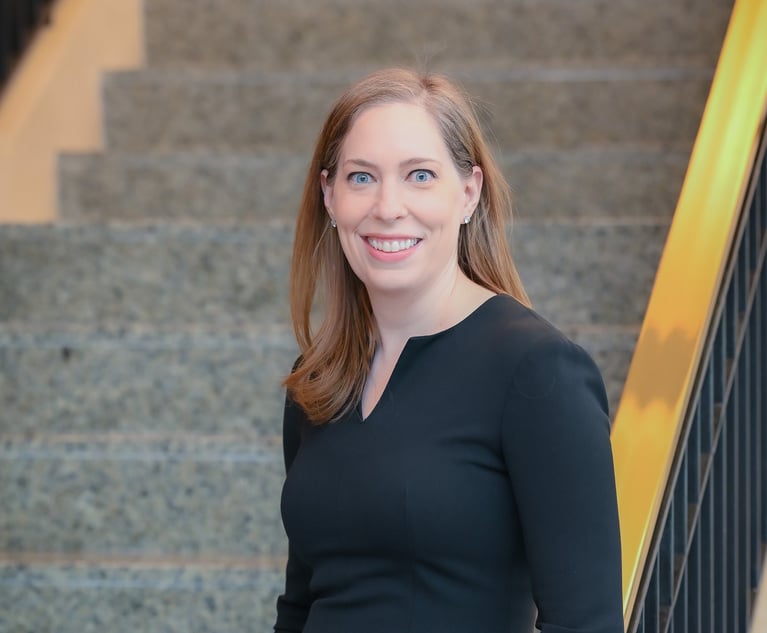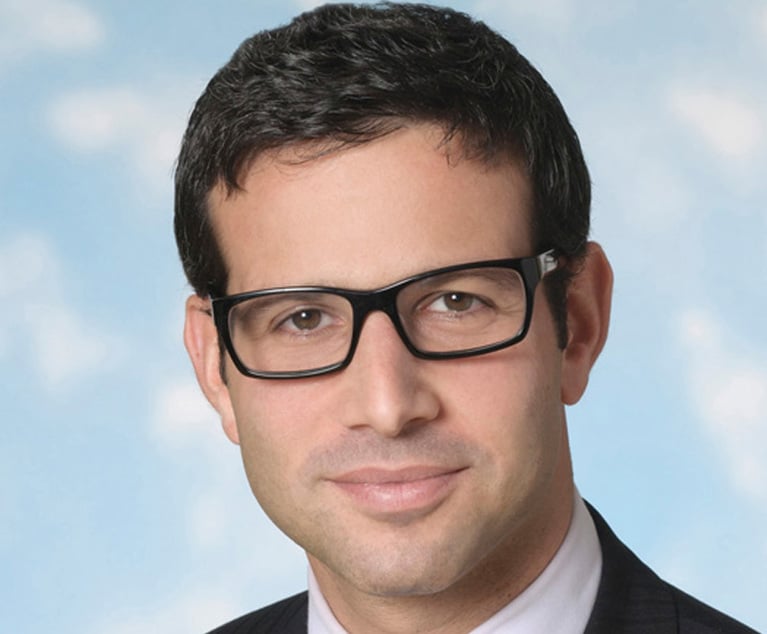 Wesley R. Powell, partner with Willkie Farr & Gallagher. Courtesy photo
Wesley R. Powell, partner with Willkie Farr & Gallagher. Courtesy photoWillkie's Wes Powell Making an Impact With 'Portable' Experience
"The more 360-degree view you acquire when thinking about problems your clients may have, the better it equips you to deal with the next problem," said Powell, a finalist for the The American Lawyer's 2024 Attorney of the Year honor.
November 12, 2024 at 12:41 PM
4 minute read
Willkie, Farr & Gallagher’s Wesley Powell chairs the firm’s antitrust and competition practice, but it is clear there is a fire within to see that those who have less—as he did growing up—are given legal representation for those most important matters.
"I grew up in a tiny town in rural Tennessee where there was a high level of poverty," said Powell, who also chairs the firm's pro bono practice, in an interview. "And I was raised Methodist. The 'do no harm' mentality of that never left me. The older I get, the more clear it becomes that I am not that far away from that town in Tennessee."
After undergrad at Vanderbilt University and while at Duke Law School, Powell met a professor who had the idea of launching a pro bono program for living wills and end-of-life counseling for those affected by the AIDS crisis.
"I have never really been without pro bono work," said Powell, a finalist for The American Lawyer's 2024 Attorney of the Year honor.
Powell's recent work includes Ciaramella v McDonald in the U.S. District Court for the Southern District of New York, which he handled with the Legal Aid Society, on behalf of Medicaid-eligible New Yorkers whose expenses associated with medically necessary dental services were not reimbursable by New York's Medicaid program, due to a coverage ban on dental implants and restrictions on dentures, root canals and crowns.
Part of the issue, according to Powell, was a rule that sounded like it could have been written in 1790: the "eight points of contact" rule, which meant that if there were four teeth (or more) on the top of one's mouth and four on the bottom that made contact with each other when the mouth was shut, then the state deemed you to have "adequate dentition." At the time, denture users were only allowed to get new ones, but only every eight years. That has now also been rectified by the suit.
"I have been involved in several impactful pro bono cases over the years, but this might have the most impact for the most people," Powell said. "If you have seriously poor dentition, you can't get jobs, and you have a much higher likelihood of obesity. It really is lifechanging."
Powell worked with the Transgender Legal Defense Fund in Lange v Houston County, where a sheriff's deputy in Houston County, Georgia, claimed she was being denied medically necessary care under her health plan. The U.S. District Court for the Middle District of Georgia ruled that the defendants could be held liable under Title VII of the Civil Rights Act. That ruling was upheld by the U.S. Court of Appeals for the Eleventh Circuit last May. (Powell said the matter is entering a new phase and is not yet fully resolved). The ruling was the first time a Title VII violation was found for a health plan excluding gender-affirming care in the southern U.S., according to the plaintiffs.
Powell also litigated Toomey v. Arizona, challenging a coverage exclusion for transition-related health care on behalf of transgender individuals employed by the state. After years of litigation, in 2023, the state abandoned its policy of excluding such coverage for state employees.
As pro bono chair at Willkie, Powell oversees the efforts of more than 600 lawyers in 15 offices who are slated to do roughly 80,000 hours of pro bono work this year. And while his "day job" pays the bills, Powell said that each aspect of his work informs the other.
"Over my career, I have developed my skills as a litigator, advocate, and counselor to clients, and I think I bring all of that experience to these pro bono cases," he said. "When I think of the many hours I spent counseling Sgt. Lange, I am not talking about antitrust, but the experiences I have are portable to this work."
He said the inverse is true as well.
"The more 360-degree view you acquire when thinking about problems your clients may have, the better it equips you to deal with the next problem," he said.
"I grew up a gay kid in that town and never imagined in a million years that I would get to get married. That I would have two children," he said. "I would have laughed at you if you told me that. And I feel this motivation to find something to do for people that have less. That has never left me."
NOT FOR REPRINT
© 2025 ALM Global, LLC, All Rights Reserved. Request academic re-use from www.copyright.com. All other uses, submit a request to [email protected]. For more information visit Asset & Logo Licensing.
You Might Like
View All
'I Want to Leave a Mark': What We Learned From This Year's Industry Awards Winners

Elizabeth Cooper of Simpson Thacher on Building Teams in a 'Relationship Business'
4 minute read
Kirkland's Daniel Lavon-Krein: Staying Ahead of Private Equity Consolidation

Vinson & Elkins: Traditional Energy Practice Meets Energy Transition
4 minute readTrending Stories
- 1With DEI Top of Mind, Black Judges Discuss Growing Up During Segregation, Efforts to Diversify the Profession
- 2Big Law's Middle East Bet: Will It Pay Off?
- 3'Translate Across Disciplines': Paul Hastings’ New Tech Transactions Leader
- 4Milbank’s Revenue and Profits Surge Following Demand Increases Across the Board
- 5Fourth Quarter Growth in Demand and Worked Rates Coincided with Countercyclical Dip, New Report Indicates
Who Got The Work
J. Brugh Lower of Gibbons has entered an appearance for industrial equipment supplier Devco Corporation in a pending trademark infringement lawsuit. The suit, accusing the defendant of selling knock-off Graco products, was filed Dec. 18 in New Jersey District Court by Rivkin Radler on behalf of Graco Inc. and Graco Minnesota. The case, assigned to U.S. District Judge Zahid N. Quraishi, is 3:24-cv-11294, Graco Inc. et al v. Devco Corporation.
Who Got The Work
Rebecca Maller-Stein and Kent A. Yalowitz of Arnold & Porter Kaye Scholer have entered their appearances for Hanaco Venture Capital and its executives, Lior Prosor and David Frankel, in a pending securities lawsuit. The action, filed on Dec. 24 in New York Southern District Court by Zell, Aron & Co. on behalf of Goldeneye Advisors, accuses the defendants of negligently and fraudulently managing the plaintiff's $1 million investment. The case, assigned to U.S. District Judge Vernon S. Broderick, is 1:24-cv-09918, Goldeneye Advisors, LLC v. Hanaco Venture Capital, Ltd. et al.
Who Got The Work
Attorneys from A&O Shearman has stepped in as defense counsel for Toronto-Dominion Bank and other defendants in a pending securities class action. The suit, filed Dec. 11 in New York Southern District Court by Bleichmar Fonti & Auld, accuses the defendants of concealing the bank's 'pervasive' deficiencies in regards to its compliance with the Bank Secrecy Act and the quality of its anti-money laundering controls. The case, assigned to U.S. District Judge Arun Subramanian, is 1:24-cv-09445, Gonzalez v. The Toronto-Dominion Bank et al.
Who Got The Work
Crown Castle International, a Pennsylvania company providing shared communications infrastructure, has turned to Luke D. Wolf of Gordon Rees Scully Mansukhani to fend off a pending breach-of-contract lawsuit. The court action, filed Nov. 25 in Michigan Eastern District Court by Hooper Hathaway PC on behalf of The Town Residences LLC, accuses Crown Castle of failing to transfer approximately $30,000 in utility payments from T-Mobile in breach of a roof-top lease and assignment agreement. The case, assigned to U.S. District Judge Susan K. Declercq, is 2:24-cv-13131, The Town Residences LLC v. T-Mobile US, Inc. et al.
Who Got The Work
Wilfred P. Coronato and Daniel M. Schwartz of McCarter & English have stepped in as defense counsel to Electrolux Home Products Inc. in a pending product liability lawsuit. The court action, filed Nov. 26 in New York Eastern District Court by Poulos Lopiccolo PC and Nagel Rice LLP on behalf of David Stern, alleges that the defendant's refrigerators’ drawers and shelving repeatedly break and fall apart within months after purchase. The case, assigned to U.S. District Judge Joan M. Azrack, is 2:24-cv-08204, Stern v. Electrolux Home Products, Inc.
Featured Firms
Law Offices of Gary Martin Hays & Associates, P.C.
(470) 294-1674
Law Offices of Mark E. Salomone
(857) 444-6468
Smith & Hassler
(713) 739-1250










